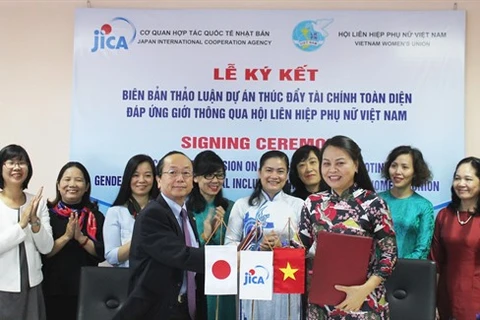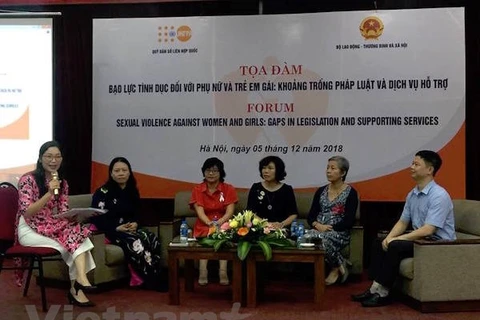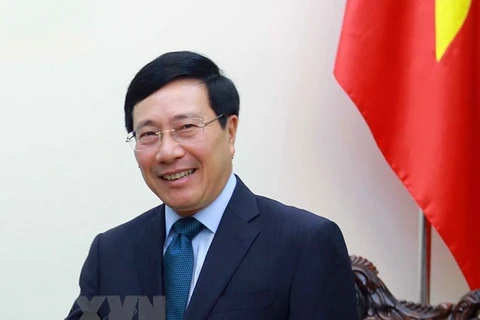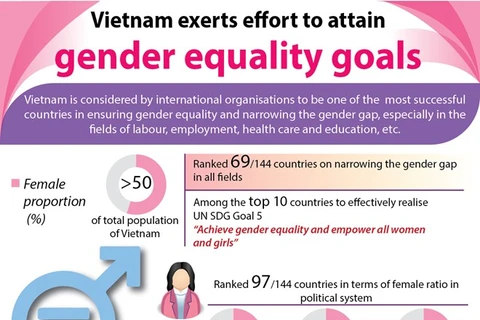Hanoi (VNS/VNA) - Women should be free to choose the job they want to do without being hindered by discriminations on the grounds of their gender or physical capabilities.
This was the message from Pham Thu Lan, deputy head of Institute of Workers and Trade Unions under Vietnam General Confederation of Labour at a policy discussion entitled “Eight equal hours” in Hanoi on December 20.
The discussion is a part of a joint project to accelerate gender equality in the revised Law of Labour implemented by the Institute of Society, Economy and Environment (iSEE) in collaboration with Oxfam Vietnam, Vietnam Chamber of Commerce and Industry (VCCI), Care International in Vietnam under the sponsorships of the Australian Department of Foreign Affairs and Trade and Australian Government’s Initiative of “Investing in Women”.
Although the 2013 Constitution, the 2006 Law of Gender Equality and the 2012 Law of Labour stress against gender-based discriminations including employment opportunities, there still remain regulations implying different treatments toward female workers.
Employers are prohibited to use female workers for 77 jobs. For example, women are banned on driving tractors over 50 horsepower.
“The list affects female workers and their rights of working, their will, employment opportunities and income. We need to have a different approach when it comes to priorities for women. They need to be empowered and to be free to make choices,” she said.
Sharing the opinion, Do Ngan Binh from the Hanoi University of Law, member of the advisory group on amending the Law of Labour, said female workers need mechanisms to have equal opportunities as their male counterparts.
In the workplaces, for example, Binh said the lack of a legislated definition of “sexual harassment” as well as rights and responsibilities of employers in preventing the issues in the current law created loopholes in applying the regulation in reality.
She suggested having appropriate mechanisms to handle sexual harassments against both female and male workers for a safer working environment for all.
Experts also touched upon equal pay for equal work and equality in approaching employment opportunities and sharing family responsibilities.
“Gender inequality at workplaces can discourage female workers, making them unwilling to contribute more. By empowering women and offering equal opportunities for all, we can motivate them to thrive and push the company forward,” said Do Thi Thuy Huong, member of Viettronics Company’s board of directors. — VNS/VNA
This was the message from Pham Thu Lan, deputy head of Institute of Workers and Trade Unions under Vietnam General Confederation of Labour at a policy discussion entitled “Eight equal hours” in Hanoi on December 20.
The discussion is a part of a joint project to accelerate gender equality in the revised Law of Labour implemented by the Institute of Society, Economy and Environment (iSEE) in collaboration with Oxfam Vietnam, Vietnam Chamber of Commerce and Industry (VCCI), Care International in Vietnam under the sponsorships of the Australian Department of Foreign Affairs and Trade and Australian Government’s Initiative of “Investing in Women”.
Although the 2013 Constitution, the 2006 Law of Gender Equality and the 2012 Law of Labour stress against gender-based discriminations including employment opportunities, there still remain regulations implying different treatments toward female workers.
Employers are prohibited to use female workers for 77 jobs. For example, women are banned on driving tractors over 50 horsepower.
“The list affects female workers and their rights of working, their will, employment opportunities and income. We need to have a different approach when it comes to priorities for women. They need to be empowered and to be free to make choices,” she said.
Sharing the opinion, Do Ngan Binh from the Hanoi University of Law, member of the advisory group on amending the Law of Labour, said female workers need mechanisms to have equal opportunities as their male counterparts.
In the workplaces, for example, Binh said the lack of a legislated definition of “sexual harassment” as well as rights and responsibilities of employers in preventing the issues in the current law created loopholes in applying the regulation in reality.
She suggested having appropriate mechanisms to handle sexual harassments against both female and male workers for a safer working environment for all.
Experts also touched upon equal pay for equal work and equality in approaching employment opportunities and sharing family responsibilities.
“Gender inequality at workplaces can discourage female workers, making them unwilling to contribute more. By empowering women and offering equal opportunities for all, we can motivate them to thrive and push the company forward,” said Do Thi Thuy Huong, member of Viettronics Company’s board of directors. — VNS/VNA
VNA

























